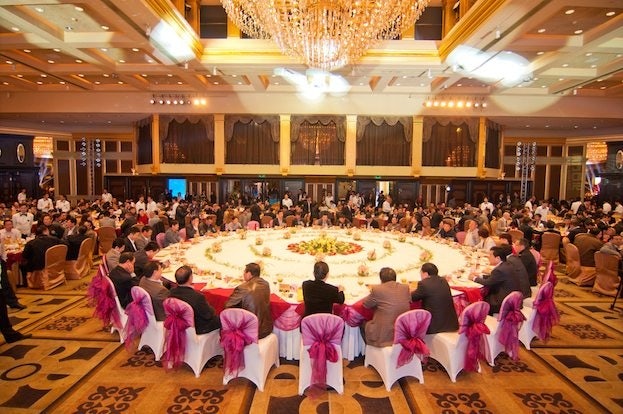
Chinese officials can say goodbye to fancy banquets for the time being. (Shutterstock)
As the Chinese government’s anti-corruption campaign and frugality initiatives rage on, new statistics show that homegrown high-end restaurants and catering companies continue to bear the brunt of decreased official spending.
According to a Chinese report on hotel news site hc360.com, data published by the Bureau of Statistics of Shanxi Province shows that catering services enterprises with annual revenue exceeding 2 million yuan (US$324,454) collected a total of 7.9 billion yuan (approximately US$1.2 billion) in 2013—a decline by one-fifth compared to last year.
The China Cuisine Association’s 2013 analysis of the local catering services market also shows a 2.5 trillion-yuan (approximately US$162 billion) annual revenue intake among domestic restaurant enterprises—marking a 21-year low with a growth rate of 9 percent. The report finds that high-end restaurants and catering services suffered an especially serious setback, logging negative growth for the first time in many years.
China’s homegrown restaurant industry has begun to “reshuffle” after 30 years of sustained and stable development, said Tu Jianqiu, executive director of the Hengyang Catering Industry Association of Hunan Province. Stock-listed high-end restaurant groups such as Quanjude (全聚德), Xiang-E Flavor (湘鄂情), Shanghai Min (小南国), and Country Style Cooking (乡村基), recently saw a sharp slowdown and a wave of shutdowns nationwide. “Forty percent of the high-end hotels and clubs in first-tier cities experienced setbacks in 2013,” stated Tu, “The industry structure has started to reshuffle.”
The report states that the Chinese Communist Party has repeatedly taken aim against this “corruption on the tongue tips” by canceling club memberships, restricting banquets, prohibiting gift-giving using public funds, and banning the use of private clubs and entertainment.
According to the article, Tan Kejian, the deputy director of the Chinese Academy of Social Sciences, believes the campaign has been able to exert pressure on corruption. The Ministry of Commerce also recently issued the "Guidelines to Accelerate the Development of Affordable Catering," aiming to increase the popular/affordable dining market share from 80 to 85 percent in five years.
In Tan’s view, upscale hotels have “abandoned their arrogance” as they seek to join the the popular market. Home-style cooking can now be seen in high-end hotels, and several administrators from high-end restaurants claim to have crossed out exotic, luxury delicacies such as sea cucumber and isinglass (a substance taken from the swim bladders of fish that is often used as an ingredient in shark-fin soup) from their menus.